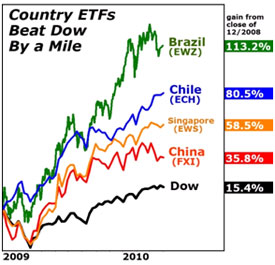Results 1 to 1 of 1
Thread Information
Users Browsing this Thread
There are currently 1 users browsing this thread. (0 members and 1 guests)
-
08-09-2010, 05:26 PM #1Senior Member


- Join Date
- May 2007
- Location
- South West Florida (Behind friendly lines but still in Occupied Territory)
- Posts
- 117,696
Massive Wealth Shift From West to Emerging Markets in Full S
Massive Wealth Shift From West to Emerging Markets in Full Swing
Stock-Markets / Emerging Markets
Aug 09, 2010 - 08:04 AM
By: Martin_D_Weiss
Martin here with a quick update on foreign markets.
One year ago, in our 2009 Global Forum, we forecast a massive shift of wealth â from the United States, bogged down with huge deficits and chronic, long-term unemployment ⦠to emerging markets, enjoying the most rapid growth on the planet.

Now, that shift is in full swing â¦
Since the beginning of 2009, despite the biggest government bailouts and stimulus of all time, the Dow Jones Industrial Average is up only 15.4 percent.
In contrast â¦
FXI, our favorite exchange traded fund (ETF) focused on Chinaâs blue chips, has gained 35.8 percent in the same period, beating the Dow by 2.3 to one â¦
The ETF tied to Singaporeâs market (EWS) has gained 58.5 percent, trumping the Dow by 3.8 to one â¦
The ETF for Chile (ECH) has jumped 80.5 percent, or 5.2 times faster than the Dow, and â¦
Our favorite Brazil ETF â EWZ â has surged by a whopping 113.2 percent, or 7.35 times better than the Dow!
In other words, for every $10,000 investors might have made in the Dow since the beginning of 2009, you could have made $73,500 simply buying and holding the Brazil ETF.
This is no fluke. We see a similar pattern of vast outperformance in virtually all time frames we review and nearly all emerging markets we sample.
Nor is this strictly a market phenomenon. As weâve told you repeatedly in recent years, we see powerful forces driving a wider and wider wedge between â¦
the mediocre performance of old and tired economies of the West and â¦
the vibrant, rapidly growing economies of the East and South.
Specifically â¦
In the U.S., deficits have now emerged as a major drag on the economy.
A few months ago, the Congressional Budget Office estimated that the presidentâs budget would result in record-breaking, back-to-back deficits of $1.5 trillion in 2010 and $1.3 trillion in 2011.
But that was before the latest bad news on the economy, and certainly before Fridayâs dismal jobs report. Not only was the labor market far weaker than Wall Street and Washington expected, but it also turned out that many prior jobs gains touted by the government were a mirage, wiped away by the single stroke of a statisticianâs revisions.
John Williams, editor of Shadow Government Statistics, explains it this way:
âAs suggested by the deterioration and revisions in todayâs labor market report, the recently-hailed economic recovery has all but evaporated. ⦠Market recognition of the re-intensified downturn is spreading, along with recognition of sharply negative implications for the federal budget deficit, for Treasury funding needs, [and] for banking system solvency. â¦
âJulyâs headline unemployment rate held at a seasonally-adjusted 9.5 percent, but not because of a stable employment environment. To the contrary, continued shrinkage of the labor force ⦠reflects an increasing number of longer-term unemployed giving up looking for work and moving ⦠into the discouraged worker category.âJoin our efforts to Secure America's Borders and End Illegal Immigration by Joining ALIPAC's E-Mail Alerts network (CLICK HERE)


 LinkBack URL
LinkBack URL About LinkBacks
About LinkBacks




 Reply With Quote
Reply With Quote

First List to Move to Archive "Non-Citizen & Illegal Migrant...
04-17-2024, 06:55 PM in Non-Citizen & illegal migrant voters